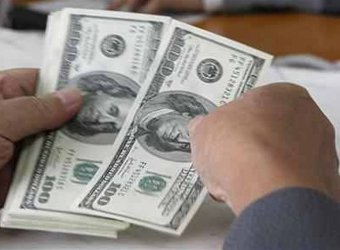The dollar stalled on Wednesday as global trade tensions remained elevated, with U.S. President Donald Trump discussing joining forces with Germany to counter China’s economic practices.
The dollar index, which measures the greenback versus a group of six major currencies, dipped 0.1 percent to 89.291. It had gained about 0.34 percent overnight, pulling away from a five-week low of 88.942.
The dollar recovered slightly on hopes that negotiations between the United States and China would produce a compromise and avoid a full-blown trade war.
But the White House said that Trump had discussed trade practices with China in calls on Tuesday with French President Emmanuel Macron and German Chancellor Angela Merkel, which could lead to an escalation of trade tensions.
The U.S. currency was 0.2 percent higher at 105.530 yen.
It had been pushed down from a high near 106.000 overnight after a slide in U.S. stocks and Treasury yields, but as fears of a global trade war faded it rebounded from the 16-month low of 104.560 yen set on Monday.
“The dollar lost some traction as equity markets sank following the latest media report on U.S. trade policy,” said Masafumi Yamamoto, chief forex strategist at Mizuho Securities in Tokyo.
He was referring to a Bloomberg report stating that the Trump administration was considering using a law reserved for national emergencies in a crackdown on some Chinese investments.
“The threat of all-out risk avoidance caused by trade concerns has eased, but some ‘risk off’ moves are likely to keep impacting currencies as long as uncertainties remain,” Yamamoto said.
The euro was 0.15 percent higher at $1.2419 after losing 0.3 percent overnight on soft euro zone economic data and dovish-sounding comments from Erkki Liikanen, a member of European Central Bank’s Governing Council.
“There is always the risk of the U.S. GDP figures due today being much weaker than expected, but major dollar-selling developments seem to have run their course for the time being,” said Masashi Murata, senior currency strategist at Brown Brothers Harriman in Tokyo.
U.S. data due later in the day include the final estimate of fourth quarter gross domestic product and pending home sales.
The pound gained 0.25 percent to $1.4190 after falling 0.5 percent on Tuesday.
The Australian dollar rose 0.3 percent to $0.7698 after dropping more than 0.9 percent on Tuesday.
South Africa’s rand dipped 0.25 percent to 11.65 per dollar with the South Africa Reserve Bank expected to loosen monetary policy later on Wednesday.
The central bank is seen cutting its repo rate by 25 basis points to 6.50 percent with domestic inflation flagging on the back of a strong rand, which reached a three-year high against the dollar in February.
“The dollar lost some traction as equity markets sank following the latest media report on U.S. trade policy,” said Masafumi Yamamoto, chief forex strategist at Mizuho Securities in Tokyo.
He was referring to a Bloomberg report stating that the Trump administration was considering using a law reserved for national emergencies in a crackdown on some Chinese investments.
“The threat of all-out risk avoidance caused by trade concerns has eased, but some ‘risk off’ moves are likely to keep impacting currencies as long as uncertainties remain,” Yamamoto said.
The euro was 0.05 percent higher at $1.2411 after losing 0.3 percent overnight on soft euro zone economic data and dovish-sounding comments from Erkki Liikanen, a member of European Central Bank’s Governing Council.
The pound gained 0.15 percent to $1.4177 after falling 0.5 percent on Tuesday.
Source: Reuters


